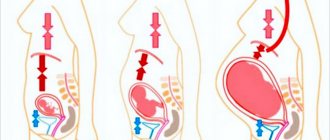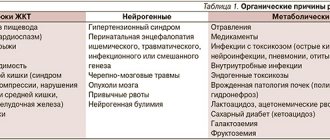If alcohol poisoning occurred
, treatment should be started immediately. First of all, you should know in what cases you should not get treatment, but immediately call a narcologist:
- For acute cutting pain in the stomach and epigastric region.
- For fainting and pre-fainting conditions.
- For atypical discharge during stool and urination, cutting pain during bowel movements and urination.
- With bloody vomiting, foamy discharge, the appearance of brownish mucus from the nose and mouth.
The above symptoms indicate severe poisoning,
which can lead to failure of internal organs and death
Why do you often feel sick after a hangover?
Nausea and vomiting are symptoms coming from the digestive system and indicating poisoning of the body.
By vomiting, he tries to get rid of harmful substances. The body contains an individual amount of enzymes that process ethanol. Therefore, every person is able to drink a certain amount of alcohol without negative consequences for their health. Some people can drink a whole bottle of vodka and still feel normal, while others feel bad even after one glass of alcohol. If you frequently experience nausea and vomiting after drinking alcohol, your body likely has fermentation problems. This pathology occurs in gastrointestinal diseases. The situation can be especially dangerous if black vomit appears, with blood, which indicates gastric bleeding.
Also, vomiting and nausea can occur due to the consumption of low-quality alcohol containing various impurities. The breakdown products of ethanol - acetaldehyde, fusel oil, acetic acid, which are more toxic than their original form, also cause poisoning of the body. After these substances enter the stomach, a gag reflex occurs, with the help of which the body tries to get rid of toxic poisons before they end up in the blood and spread throughout the body along with the bloodstream.
Urgent withdrawal of alcohol at home from 2990 ₽
placing an IV
hangover relief
We work around the clock
Call a doctor at home Leave a request and we will call you back in 1 minute
8
Or call
Symptoms and causes of alcohol intoxication
Alcohol is processed by the liver, and when drinking alcohol in small doses, a person will hardly feel the symptoms of a hangover. But if alcohol is poured into the stomach in increased doses, a noticeable reaction occurs.
When a certain amount of ethanol is ingested, which the liver cannot quickly process, acetaldehyde is deposited, which has toxic properties . It reacts with the elements of norepinephrine and dopamine, as a result of which tetrahydroisocholines are produced, and sometimes carbonyls are additionally produced. The presented elements have a psychotropic and hallucinogenic effect on the body.
If the amount of acetaldehyde reaches a critical level, the following occurs:
- loss of sensation;
- coordination disorder;
- loss of consciousness.
In fact, a hangover is poisoning due to acetaldehyde. Note that the type of drink does not matter for the severity of intoxication - only the concentration of ethanol in the blood matters. There is a theory according to which the occurrence of a hangover is caused by an excess of ethanol per body weight. A normal dose is considered to be 1 gram of ethanol per 1 kg of weight.
Accordingly, if we are talking about 80 kg of weight, then the norm for a person would be a dose of 80 ml of alcohol or 200 grams of vodka.
The following classification of the degree of alcohol intoxication and intoxication is applied:
- 1-1.5 ppm . The person becomes cheerful, talkative, coordination of movements is slightly impaired, and breathing becomes difficult. There is an overestimation of one’s capabilities and excessive emotionality.
- 1.5-2.5 ppm . Alcohol affects the central nervous system and cognitive functions of the brain. The person begins to think, speak slowly, lose coordination, sense of time and orientation. May behave aggressively. Next, paleness of the skin and vomiting are observed.
- 2.5-4 ppm . Ethanol has a negative effect on all internal organs and systems. The person does not feel pain and loses consciousness.
If alcohol is contained in a concentration of more than 4 ppm, respiratory arrest and death are possible.
Alcohol undergoes a breakdown and neutralization reaction in the liver enzyme system. Ethanol is oxidized to acetaldehyde, which, in turn, decomposes to the state of carboxylic acid. The output is water and carbon dioxide. Another name for acetaldehyde is ethanal. It has a high level of toxicity, and when it reacts, it provokes the creation of alkaloids (their effect is similar to drugs).
The symptoms of a hangover are:
- throbbing headache that gets worse with loud noises and activity;
- loss of appetite;
- nausea, vomiting;
- dry mouth, severe thirst;
- red whites of the eyes;
- photophobia;
- increased urination;
- stool disorder;
- disturbances in heart rhythm;
- tremor in the limbs;
- adrenaline melancholy: mini-depression and anxiety, obsessive feelings of shame and guilt.
Narcologists claim that there is no standard for drinking alcohol, despite all the calculations and theories. Everyone's body condition is different. Being at the same weight, two people can completely differently to similar doses of alcohol. For example, 200 grams of vodka will not turn a healthy 30-year-old man weighing 80 kg into a vegetable in the morning; he will not even feel a single unpleasant symptom. An elderly man of 60 years old, who has a bunch of chronic diseases, risks not getting out of bed from 200 grams of vodka the next day. His whole body will ache, and permanent pathologies will immediately worsen.
What should a person who feels sick after drinking alcohol do?
Nausea from alcohol can overtake you not only the morning after the feast, but also in the midst of fun.
If you feel that you are starting to feel sick, stop drinking alcohol immediately, as your body has already received serious poisoning and has begun to perceive alcohol as a poison. In this case, you should not expect the nausea to go away on its own. After a new portion of alcohol it will only intensify. If you start vomiting, you don't need to think about how to stop it. Vomiting in an adult is a natural detoxification process that allows the body to quickly cleanse itself of toxins. The urge to vomit is provoked by special centers located in the brain. If you do not have the urge to vomit, try to induce it by pressing your finger on the root of your tongue. If you vomit bile, don't be alarmed. This means that your stomach has already emptied and cleared itself, so your condition will soon return to normal. During a hangover, bile may come out two or three times. If the release of bile is more frequent, consult a gastroenterologist, since prolonged release of bile after drinking alcohol may indicate liver damage.
You should also consult a doctor if blood is present in the vomit. This indicates venous bleeding of the stomach or the presence of a peptic ulcer. Drinking alcoholic beverages with such symptoms is strictly prohibited.
Medical assistance for alcohol poisoning
Headache treatment
Help with alcohol poisoning at home can be provided by regular aspirin, Alkozeltzer, Zorex, Pantogam, Panangin (asparkam). The headache intensifies due to the effect of edema on the cerebral cortex. Relieving swelling and removing excess fluids will lead to faster relief from headaches.
Citramon for alcohol poisoning at home is taken only in rare cases, if there is no other alternative. Citramon contains caffeine, aspirin and paracetamol. Taking paracetamol during a hangover is extremely undesirable: it affects the liver. Taking aspirin within two hours of your last drink of alcohol can cause internal bleeding.
In case of alcohol poisoning, home treatment for blood pressure can only be carried out with the help of mild sedatives. These include mint, motherwort, valerian, as well as any soothing herbal teas and infusions (not alcoholic!).
Attention! If nausea and dizziness are added to tachycardia,
as well as high blood pressure,
you need to call a doctor immediately
The narcologist will assess the degree of alcohol poisoning, and will provide first aid at home professionally, assessing the general condition of the patient.
Considering that in most cases assistance with poisoning by alcohol substitutes can only be provided in a hospital setting, a referral for hospitalization can also only be made by a narcologist.
When first aid for alcohol poisoning has already been carried out, it is important to restore the normal functioning of the nervous system. The drug Mexidol has proven itself well. This is not only first aid for alcohol and nicotine poisoning, but also an excellent drug for the prevention of strokes. It is actively used in neurology and psychiatry, improves the functioning of the nervous system, normalizes sleep, relieves irritability, and increases concentration. Unlike other drugs that affect the nervous system, it does not form dependence. It is used in a shock course with increasing doses and subsequent gradual withdrawal.
To treat poisoning with alcohol surrogates, intensive therapy with drugs to restore the functioning of the central nervous system almost always includes Mexidol. However, it must be taken under the supervision of a doctor.
Toxicosis in alcohol addicts - what is it?
How long alcohol toxicosis lasts and how it manifests itself directly depends on:
- ethanol doses used;
- frequency of drinking;
- general health.
Normally, the body of any person independently produces ethyl alcohol in tiny doses. It is needed for important metabolic reactions to proceed without failure. If a person drinks alcohol, the concentration of alcohol in the blood increases sharply. As a result, negative reactions develop. Even with an indicator of 0.1 ppm, doctors record alcohol toxicosis of the kidneys and liver - vital organs begin to work in the so-called emergency mode.
Content:
- Toxicosis in alcohol addicts - what is it?
- Duration of alcohol toxicosis
- Types of intoxication
- Symptoms of alcohol toxicosis
- Damage to internal organs due to alcohol toxicosis 5.1. Liver damage 5.2. Harm of alcohol to the kidneys 5.3. Brain destruction
- How to help a patient with alcohol toxicosis
- Treatment in an inpatient drug treatment clinic
- Coma
Drinking high doses of alcohol causes negative changes in the functioning of internal organs.
It’s not for nothing that drug addicts call alcohol a “legal drug” - it not only quickly causes physical and psychological dependence, but also causes irreparable harm to health. Intoxication with strong drinks leads to alcohol toxicosis . The condition is very insidious. In some cases, if the patient is not promptly provided with qualified medical care, coma develops. It can be fatal.
Folk remedies
The most effective and at the same time safe are traditional medicine . For example, drinks with added salts, such as mineral water or brine, can quickly restore the amount of fluid in the body. A drink made with lemon juice and no added sugar helps relieve headaches. Homemade bread kvass helps to quickly eliminate all the symptoms of a hangover.
Doctors recommend eating two or three tablespoons of honey during withdrawal symptoms.
A good folk remedy containing a large amount of vitamins and minerals is sauerkraut.
You should not alcohol in the morning in order to cure like with like. This:
- will not relieve a person from nausea,
- will not help normalize fluid levels in the body
- and will not restore digestive processes.
Drinking alcohol can only aggravate the situation and cause continued drinking.
Types of intoxication
When drawing up a treatment program, narcologists always determine the degree of alcohol intoxication. She may be:
- Light (up to 1000 ml of ethanol in 1 liter of blood).
- Medium (from 1000 to 2500 ml/l).
- Heavy (more than 2500 ml of alcohol in one liter of blood).
It is important to know that severe poisoning can cause sudden death. Relatives of an alcohol addict cannot independently determine how far the situation has gone. This requires highly accurate laboratory diagnostics. Therefore, you should never self-medicate.
What to do to combat nausea
Medicines can be used to improve well-being . If withdrawal symptoms are accompanied by severe nausea, then sorbents . Among them:
- Smecta,
- Neosmectin,
- Enterosgel,
- Glutargin,
- Liferan.
These substances promote the absorption and subsequent elimination of acetaldehydes from the body. If these products are not at hand, they can be replaced with regular activated carbon. It is taken at the rate of one tablet per ten kilograms of a person’s weight.
After taking sorbents, it is necessary to take care of digestion and take medications that normalize the functioning of the gastrointestinal tract. To normalize their condition, the following are used:
- Cerucal,
- Zofran,
- Motilium.
You can restore proper liver function with the help of hepatoprotective agents. They may contain a plant component such as milk thistle. These medications include Essentiale and Heptral. Medicines containing succinic acid are good neutralizers of toxins.








